Drink Driving Lawyers
Drink driving is an incredibly stressful situation many Queenslander’s face, this article is written to help people understand drink driving, drink driving penalties and whether to hire a drink driving lawyer. In Queensland unlike other states there is a mandatory requirement to disqualify a person’s drivers licence for drink driving no matter what the personal circumstances are or the effect a disqualification will have on a person and their family.
A drink driving charge is one of the more common offences that a magistrate will encounter however along with increased enforcement and public education over the past few years the courts attitude to drink driving has harden especially in Brisbane and the Gold Coast and Sunshine Coast courts. If you are charged with a DUI or drink driving offence do not treat it lightly as the magistrate will not be.
Since 2010 Clarity Law has been one of the leading drink driving lawyers in Queensland. We provide the certainty of affordable fixed fees along with the easiest and quickest way for us to represent you, in most cases you won’t even need to come into our office. We can appear as your solicitor in any court representing people charged with a drink drive from Southport to Beenleigh, Brisbane to Strathpine, Caboolture to Maroochydore and north to Hervey Bay and out to Ipswich and all courts in between.
Our founder Steven Brough is one of the most experienced traffic lawyers in Queensland having appeared in court thousands of times since 2001 helping clients with drink driving and other traffic offences.
We hope you will find this page useful, we are sure it is the most comprehensive guide to drink driving in Queensland. We will discuss drink driving penalties, what occurs in court and what you can do to minimise any drink driving penalty and whether hiring a drink driving lawyer is worth it and what they can do.
What level of alcohol will see me charged with drink driving?
In general, the higher the BAC reading the worse the punishment. In Queensland the BAC limits are as follows:
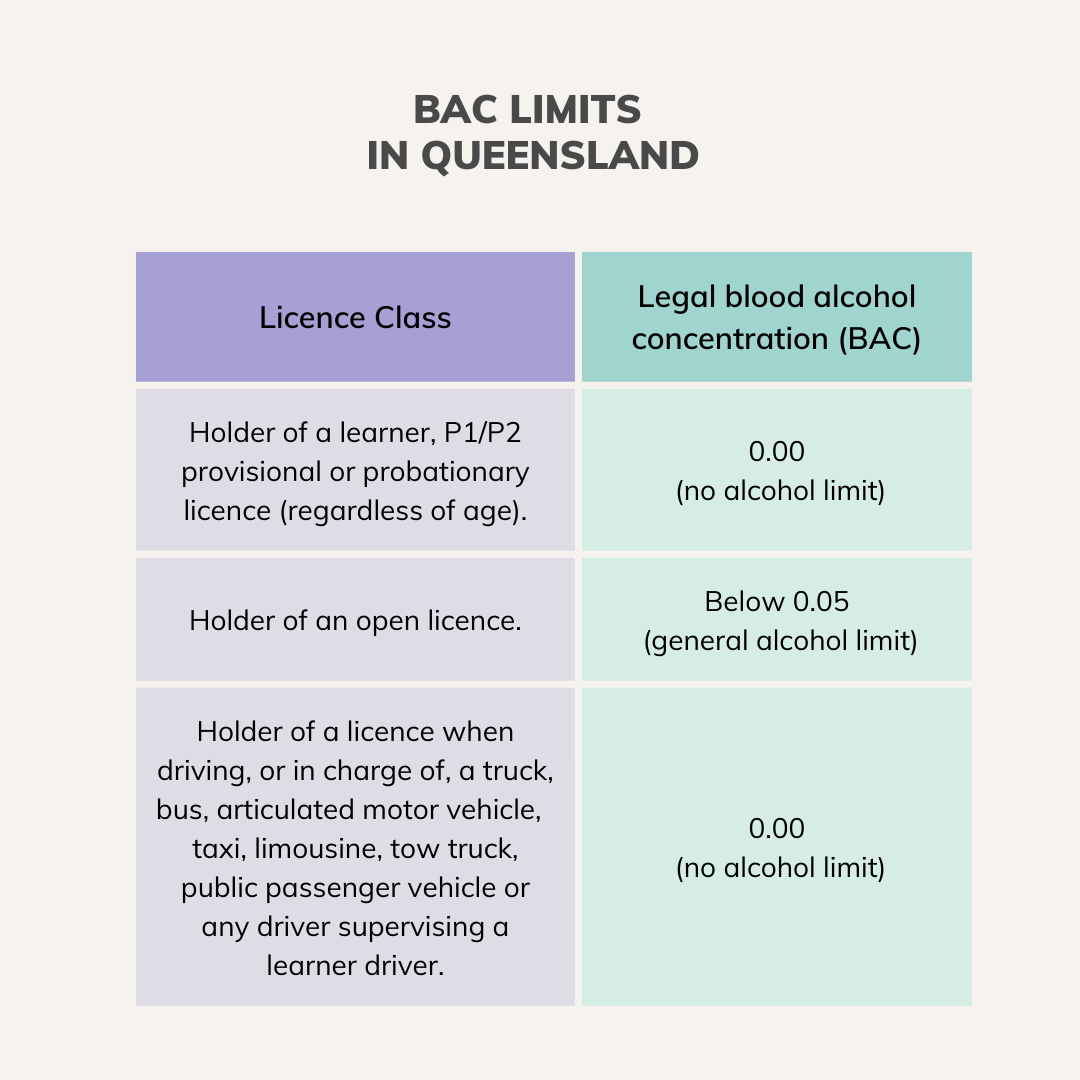
Let’s take a closer look at the BAC limits in Queensland.
Open Licence holder:
The general BAC limit for drivers holding an open licence, including those with a car or motorcycle licence, is 0.05%. This means that if a driver is found to have a BAC level of 0.05% or above, they are considered over the legal limit and can be charged with a drink driving offence.
Learner, Provisional, and Probationary Licence Holders:
Learner, provisional, and probationary licence holders face stricter BAC limits. For these drivers, the legal BAC limit is set at 0.00%. This zero-tolerance policy reflects the importance of prioritizing road safety for inexperienced drivers who are still developing their skills.
Professional and Commercial Drivers:
Professional drivers, such as those operating taxis, buses, or heavy vehicles, are subject to a zero alcohol limit. The zero limit reflects the responsibility placed on these drivers to ensure the safety of their passengers and the public.
For more information check out our article on BAC limits in Queensland.
What is a DUI?
Let’s breakdown some of the words used to discuss drink driving in Queensland.
Drink driving is more of a general term that covers all the levels of drink driving that is low range, mid range and high range.
UIL (under the influence) and DUI (driving under the influence) technically refer to only high range drive driving. UIL is a term used in the legislation in Queensland while DUI is an American term that has become more widely used in Queensland. Drunk driving is also more an American term but drunk driving means just drink driving, there is no legal difference in the words.
Low range refers to a reading of .05-.99, mid range refers to a reading of .1 to .149 and high range refers to a reading of and over .15.
Levels of Drink Driving
In Queensland there are 4 levels of drink driving
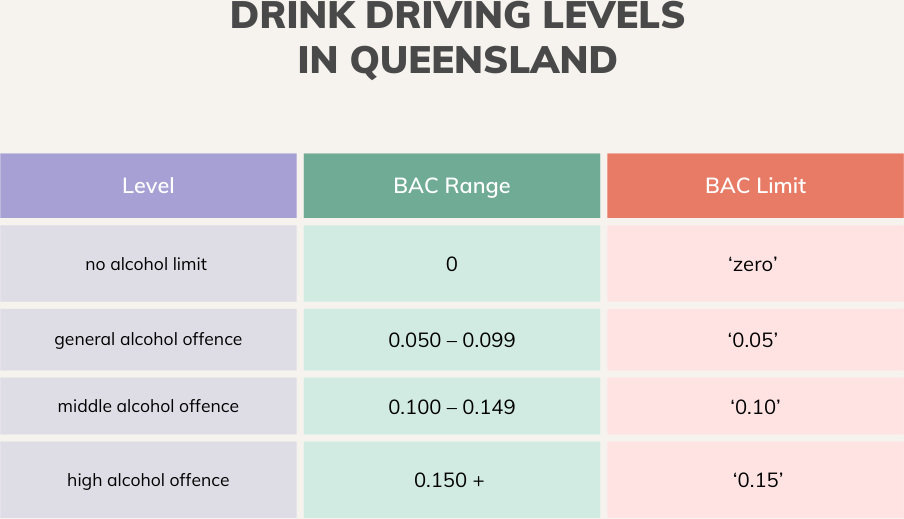
I don’t understand how I could be over the limit
Clients are often very shocked at their reading. This is especially true for first time drink drivers. In our experience this is generally down to:
- Stress levels
- Lack of food
- Drinking stronger non pre-mixed drinks
- Losing track of the amount of drinks consumed
- Miss-calculating the time it takes for the alcohol level to come down after stopping
- Type of build/amount of body fat
- Drinking quickly
We have had clients who followed the old guidelines of 2 standard drinks in the first hour and one every hour after that and were still over the limit.
See our article on why are more people being arrested for drink driving in the morning which breaks down how alcohol is process by the body especially overnight. In summary however alcohol leaves the body at an average rate of 0.015 g/100mL/hour, which is the same as reducing your BAC level by 0.015 per hour.
Factors that affect the absorption rate include sex, body size and food intake therefore the .015 level is just a very general guide.
People often just misunderstand how long it takes to get rid of alcohol from the body.
What is the Law?
The Transport Operations (Road Use Management) Act 1995 is the legislation that sets down the rules of drink driving in Queensland.
Section 79 of that legislation is the primarily section that covers the laws of drink driving while section 86 covers the penalties the court can impose.
Low range drink driving
In Queensland, Australia, "low range drink driving" refers to a specific blood alcohol concentration (BAC) level at which a person is found to be operating a motor vehicle with alcohol in their system.
The term "low range" refers to the lower end of the BAC spectrum that is considered illegal for driving. BAC is a measurement of the amount of alcohol present in a person's bloodstream, expressed as a percentage. In Queensland, the legal BAC limit for most drivers is 0.05%. This means that if a driver's BAC is found to be 0.05% or higher, they are considered to be drink driving.
"Low range drink driving" refers to cases where a driver's BAC is above the legal limit of 0.05% but below .10.
Mid range drink driving
Mid range drink driving refers to a BAC reading of .10 up to .149. Mid range drink drivers are subject to immediate licence suspension, increased court penalties and the requirement to install an interlock at the end of the disqualification period when compared with low range drink drivers.
High range drink driving
High range drink driving is a reading of .15 or more. It is the most serious drink driving charge in Queensland. A person charged with high range drink driving will have their licence immediately suspended by the police and will be subject to the interlock provisions when their disqualification period ends as well as the most harsh penalties.
Drink driving arrest process
The police have the right to test someone for drink driving where the officer has found such person, or suspects on reasonable grounds that such person, was during the last preceding three hours:
- driving a motor vehicle, tram or train on a road or elsewhere;
- attempting to put in motion a motor vehicle, tram or train on a road or elsewhere;
- in charge of a motor vehicle, tram or train on a road or elsewhere
After an arrest, emotions can run high, but it's essential to remain as calm and composed as possible. Cooperate with the police, but remember that you have the right to remain silent other than answering basic questions like your name, address etc.
Unless there are some other charges then the police will grant bail or give the person a notice to appear in court at a later stage.
The police have suspended my drivers licence
If you are charged with drink driving then your licence will be suspended for a period of time immediately following the offence. If you are charged with low range drink driving that period will be 24 hours. If you are charged with mid range or high range drink driving that period will be until your court date.
It is possible to make an application to the court to keep driving until your drink driving offence is finalised in the court. This is known as a section 79E application. The application must be made within 21 days from the date of the arrest.
Although this option is open to both mid range and high range drivers its really only useful for mid-range drink drivers who ultimately want to apply for a work licence and who cannot stop driving until their court date as often the court date may be several weeks away.
The application for a 79E licence requires extensive affidavit material so please contact us for more information about the process.
Its critical to realise that if you are caught driving while your licence is suspended this will be a separate charge that carries a minimum disqualification period of 2 years. We have seen a number of clients who are charged with drink driving, their licence is then suspended for 24 hours by the police and then after they leave the police station, they go back to car to drive it home and the police are there waiting for them. It is not possible to apply for a work licence if you are caught driving under a police licence suspension.
What is the penalty for drink driving in Queensland?
In general the penalty for a first drink driving charge in Queensland will involve a fine and a period of disqualification. The fine is up to the Magistrate, the legislation only provides the maximum fine the Magistrate can impose.
The disqualification period is also up to the Magistrate, for low range drink driving and mid range drink driving charges the legislation provides both a minimum and a maximum disqualification period. From high range drink driving the courts are set just a minimum disqualification period.
The minimum and maximum disqualification periods are increased where a person has a previous drunk or drug driving charge in the last 5 years.
The actual penalty depends on a number of factors including;
- Your BAC reading
- Did a accident occur
- Was there a passenger in the car
- The reason you were driving
- Your traffic and criminal history
- Your work situation
- What your personal circumstance are
- If you have done a drink driving course like QTOP
- Which Magistrate hears your matter
Your Blood Alcohol Concentration (BAC) level:
Your BAC, indicating the alcohol content in your breath or blood, is measured in grams of alcohol per 100 millilitres of blood. This reading is a pivotal consideration for the Magistrate when determining the penalty.
Occurrence of an accident:
If a collision took place, the penalty is likely to escalate, especially if there was damage to property or injuries to individuals.
Presence of passengers:
Having passengers, particularly children, in the vehicle can contribute to a heightened penalty.
Purpose of driving:
The reason behind your driving matters. For instance, if it was a short drive for securing a vehicle, the penalty might be less severe. However, knowingly driving while over the limit could lead to a more severe penalty.
Your past driving and criminal record:
This factor carries significant weight. The Magistrate will closely scrutinize your history of traffic offences and criminal activities. Prior instances of drink driving, especially within the last 5 years, will almost certainly incease the penalty. For instance, a recent prior low range drink driving charge could extend the minimum disqualification period from 1 to 3 months.
Personal and employment circumstances:
Your personal background, including family responsibilities and work commitments, will be considered by the Magistrate in deciding the penalty. The impact of disqualification on your ability to provide for your family or maintain employment is taken into account. In certain situations, you might be unable to obtain a work license, resulting in substantial hardship due to an inability to work.
Completion of a driving course:
Enrolling and completing a traffic offender course prior to your sentencing date can lead to a reduced penalty. One such course that can be beneficial is the QTOP course.
If you apply for a work licence
If you seek a work licence the magistrate can increase the disqualification period.
Magistrate overseeing your case:
While Queensland's Magistrates strive for consistency in penalty imposition, individual Magistrates may hold distinct perspectives on appropriate penalties, particularly for high range drink driving charges. This is why the presence of an experienced traffic lawyer, who is well-versed in the Magistrates' tendencies, is highly valuable.
We have a full article on drink driving penalties on our blog.
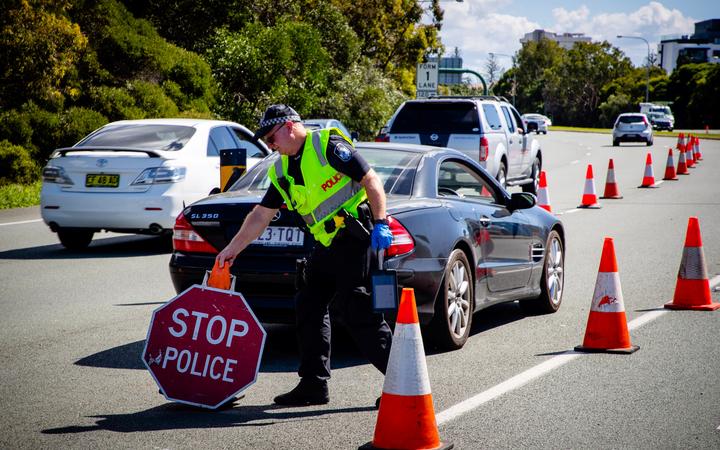
What period of disqualification of my driver licence will I get?
First time convictions usually carry a fine and disqualification. The length of disqualification and amount of the fine depends largely on the blood alcohol limit. If there are previous convictions the fine and disqualification time will increase. According to the legislation if there are 3 convictions in 5 years with BAC readings above 0.15% jail time will be a compulsory part of the punishment.
Below is a table showing a table of minimum and maximum licence disqualifications that apply.
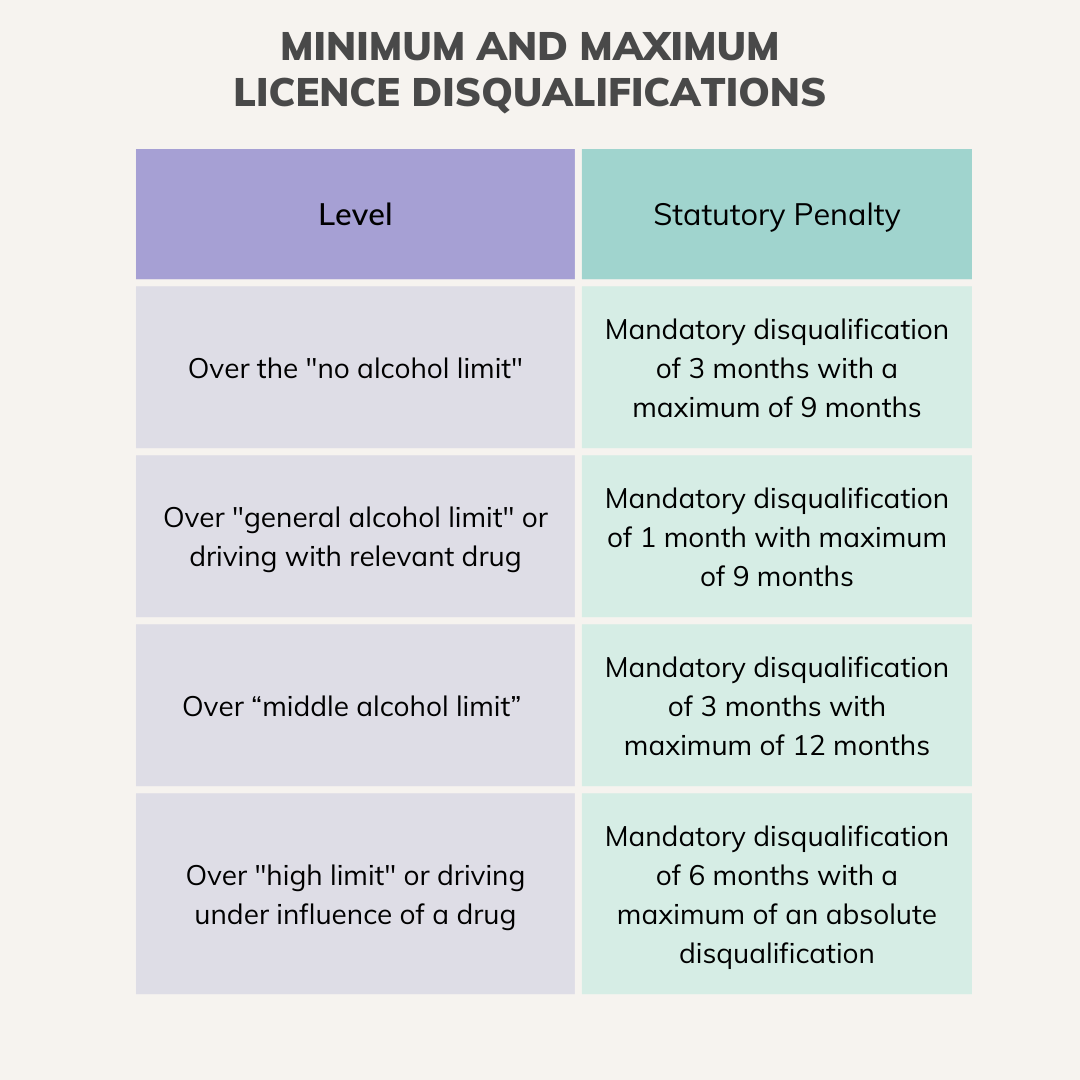
What is the best case scenario for a first time drink driving charge?
A very general rough guide to penalties for a first time offender with no previous offences is listed below; please note this is not legal advice as to your potential penalty it is merely a general guide. Employing a lawyer will almost always reduce your disqualification period.
|
BAC Reading |
Possible Disqualification |
Possible Fine |
|
.05-.07 |
1-2 months |
$400 |
|
.07-.08 |
2-3 months |
$500 |
|
.08-.1 |
3-4 months |
$600 |
|
.1-.12 |
4-5 months |
$750 |
|
.12-.13 |
5-6 months |
$850 |
|
.13-.15 |
6-7 months |
$1000 |
What other penalties will I get?
If this is a first offence and you have no other charges or previous convictions then fines and licence disqualifications are usually the penalties.
So when does fines and disqualification stop being appropriate? Generally the penalties will become much more serious when:
- a person has previous drink driving charges
- the person has a bad traffic history
- someone was hurt in an accident
- cars or other property was damaged
What can I do to reduce my penalty and disqualification period?
The best thing is obviously to engage an experienced traffic lawyer to act for you. A lawyer knows what the court needs to hear to get the lowest penalty possible.
Other things you can look to do are:
- obtaining character references
- where appropriate seek medical help if needed
- completing a traffic offender program
- completing a letter of apology
- get a good traffic lawyer

This is not my first drink driving charge
If this is not your first drinking driving charge then if the police have issued you with a notice to allege previous conviction then this will increase both the minimum and sometimes maximum licence disqualification period. It will also increase the fine. You should seek legal advice on other potential penalties that might be imposed.
In cases where the reading is very high or where there was an accident or if the person has other drink driving charges the court may consider imposing
For more information read our blog post on From Bad to Worse: What Happens if You Have a Prior Drink Driving Offence in Queensland?
The police charged me with other offences as well as the drink driving charge
If you have other driving charges such as disqualified driving, then the penalty will be cumulative that means if you get a 12 month disqualification for the drink driving charge and 2 years for the disqualified driving charge then the total time off the road will be 3 years.
In that example you could seek a licence reinstatement through the courts after 2 years.
Again you should seek legal advice on the potential penalty especially if you have other charges as those charges can dramatically increase the possible punishment.
Will I go to jail for drink driving?
If this is your third high range drink driving charge in 3 years then the court must impose a term of imprisonment. It does not mean you will potentially serve time in prison as the court could potentially wholly suspended any sentence or give immediate release on parole if proper legal arguments are made.
If an accident occurred and someone was hurt or you have previous traffic or criminal history then the courts might be looking at whether a prison sentence might form part of the penalty.
Drink driving on P’s
People on provisional licences have a zero alcohol limit, this means even a tiny amount of alcohol in their system will result in a drink driving charge.
P Platers are also exposed to higher levels of disqualification. A first time offender faces a minimum 3 months loss of licence.
P Plater also cannot apply for a work licence and Queensland Transport will subject them to late night driving restrictions.
If the driver is under 18 years of age at the time of the offence then the drink driving offence will be heard in the Childrens court. Please see our blog post on licence disqualifications in the children’s court.
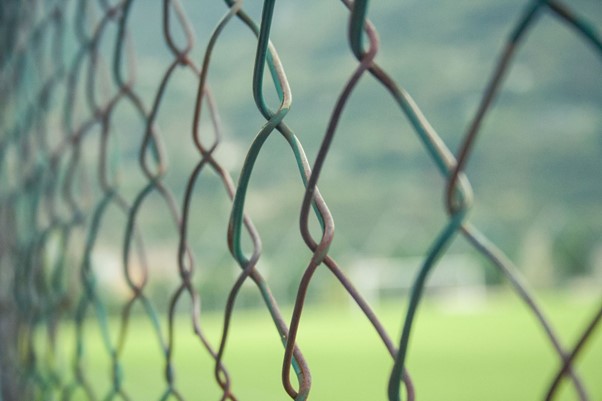
I did not agree to give a sample of my breath or blood
It is also an offence to refuse or fail to provide a specimen of breath for analysis. If you are charged with this you are considered to have committed a high range drink driving charge (DUI) . You cannot apply for a work licence if charged with refusing a breath or blood test.
The word “fail” is broader than mere refusal (although it also includes refusal) – a person “fails” to provide a sample if that sample is insufficient to conduct the test or is not provided in such a way that allows for the test to be conducted. For example, if a person starts to breathe into a breathalyser, but stops before a sufficient sample is taken, that could amount to a “failure” to provide a sample, and the police could charge the person with failing to provide a sample.
Police have the power to require someone to provide a specimen of breath, saliva, or blood for the purposes of determining that person’s blood-alcohol content. A police office may only make this request if the officer reasonably suspects that the person either drove a motor vehicle, attempted to drive it, or was in charge of the vehicle up to 3 hours prior (note that the definition of being “in charge” of a vehicle is quite broad – the person need only be in a position to be able to operate the vehicle without first taking control of the vehicle from someone else). The police may also require someone to provide a specimen of breath, saliva, or blood at the scene of a traffic accident that caused injury, death, or damage to property.
Once a police officer makes such a request, that officer may take the person to the nearest police station, or to some other place (such as a hospital) that has the necessary equipment for carrying out a breath or blood test. The person may be taken there by force, if necessary. The police officer may require multiple samples of either breath or blood if it is reasonably necessary to do so in order to complete testing.
If you refuse a breath test you cannot then request a blood test and vice versa.
It is a defence to the charge to prove that, at the time the request was made to provide a sample of breath or saliva, the person was suffering from an illness that made them incapable of providing such a sample. It is also a defence to prove that, at the time of the request, the person’s health could have been affected by giving the sample. Proof is provided by a medical certificate that the person carries with them and can show the police officer at the time of the request. Otherwise, the person must prove that they had such a medical condition in court, after they have been charged. Remember, however, that the police can ask the person for a different type of sample.
It is also a defence to prove, to the court, that the request was not made lawfully or that there was a substantially good reason to not provide a specimen (other than trying to avoid the results of the test).
In summary
Refusing or failing to provide a specimen of breath for analysis constitutes an offence, categorized as a high range drink driving charge (DUI), and disqualifies one from applying for a work license. The term "fail" encompasses more than just refusal, also encompassing insufficient or improperly provided samples, leading to potential charges. Police can demand breath, saliva, or blood specimens if they reasonably suspect recent vehicle operation, even within 3 hours, or in cases of accidents causing harm or damage.
Upon request, individuals can be transported to appropriate facilities for testing, even forcibly if necessary, and multiple samples may be required. A defence includes proving incapacity due to illness or health impact, supported by medical certificates, or demonstrating the request's unlawfulness or substantial justification. Notably, switching between breath and blood tests is not permissible.
For more information see our article on refusing a breathalyser test in Queensland.
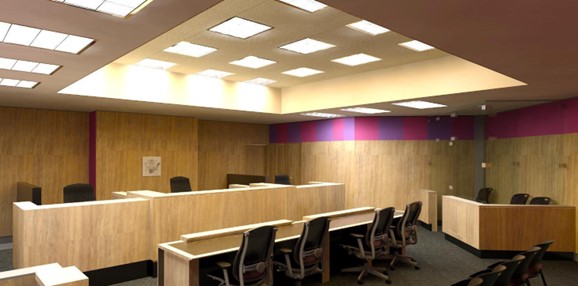
Can I get a work licence for a drink driving charge?
It may be possible for you to apply for a work licence if you held an open Queensland licence at the time of the offence, are charged with low or mid-range drink driving and had no suspensions of your licence in the last 5 years but this must be done at the time you appear in the court to plead guilty, it cannot be done afterwards. You cannot apply for a work licence if you are charged with high range drink driving (driving under the influence) or were subject to the no alcohol limit.
Please see our section on work licences for further information or check out the most comprehensive guide on the internet on how to apply for a work licence.
A work licence only allows you to drive for work purposes you cannot get a work licence or hardship licence to be able to drive for person reasons i.e. driving your children to school. In Queensland a period of disqualification must be imposed and so if personal driving is critical all you can do is try and minimise the disqualification period as much as possible.
The court also has the option to double then period of disqualification they would have imposed if no work licence was applied for. Well thought out submissions and arguments before a Magistrate can in our experience significantly reduce the length of your disqualification. There are a number of factors that can lead a magistrate to impose the lowest penalty possible, we know them all.
Summary
To be eligible to apply for a work licence you must:
- hold a current Queensland open driver's licence for the vehicle you were driving. The open licence must have been held at the time of committing the offence. Provisional and learner drivers cannot apply for a work licence
- have had a blood alcohol level of less than 0.15% or the drug driving offence must be been driving with a relevant drug and not drug driving UIL
- not have been driving for your job at the time you were charged. There are some exceptions where driving is not the main component of your job e.g. labourers driving to a work site or fencing contractors picking up materials to use onsite
- not have been driving under a licence that required your blood alcohol level (BAC) to be zero e.g. if you are on a learner, provisional, probationary or restricted license.
In the last five years you must not have:
- been convicted anywhere of drink driving or a similar offence
- been disqualified by any court
- had a licence suspended or cancelled (except in some limited circumstances like certain SPER suspensions that did not go to court).
- Applied for a work licence
In order for the court to grant a work licence you must show the court that you are a 'fit and proper person' and that if you don't get a work licence this will cause you or your family extreme hardship by depriving you of your means of earning a living.
To prove this you will need an affidavit of yourself (not just a letter) as well as one from your employer (if you are employed) that addresses the following:
- Your personal circumstances like where you live, with who etc
- What work you do and a detailed explanation of what driving for work you need to do
- The days and hours you work including any overtime
- Why you can’t use taxi’s or public transport
- Your financial circumstances including your income and expenses and those of you partner (if applicable)
- How your employment or if self-employed your income would be affected by not being granted a work licence
- How the drink driving charge came about and if necessary you will need to address other offences on your traffic history (or criminal history)
- What conditions the court should impose on your work licence
I was charged with high range drink driving and I read you cannot get a work licence
Unfortunately this is correct. You cannot apply for a work or restricted licence if you are a high range drink driver that is over .15.
See our article on high range drink driving and work licences
I wasn’t driving the vehicle but I was arrested for being in charge of a motor vehicle
You can be charged with drink driving being in charge of a vehicle if you had control of the motor vehicle for example if you were in the driver’s seat and had the keys near you even if you were not driving or had no intention of driving. Often this occurs when people are in the car waiting to be picked up, in the car wanting to find something or just sleeping.
It does not matter that the car was not on a road. You can be charged with drink driving even if the car was on private property such as a car park or driveway.
In simple terms, being “in charge” has the underlying idea of being “responsible”. In Queensland, it seems that the courts consider someone must be responsible for cars parked on public roads. Therefore, you are in charge of your car until you give responsibility of your car to someone else. This notion is applied fairly broadly; for example, you can still be “in charge” of your car, even if it has been in an accident. Nevertheless, the legislation does provide for certain, very limited, circumstances where you will not be convicted of an offence even though you were found to be “in charge” of your car and were over the legal limit.
In general we find that the clients who have been arrested for being in charge of a motor vehicle while over the legal limit fall in the following categories;
- Someone who started to drive, felt they shouldn’t continue and have pulled over and “slept it off” in the car
- Someone waiting in the car to be picked up
- Someone who has returned to their car to charge up their mobile or shelter from bad weather
- Someone who has had an argument with someone and is “cooling off” in the car listening to music.
We have a whole article on the offence of drink driving while in charge.
Can I be charged with drink driving not on a road?
In Queensland you do not have to have driven on a road to be arrested for drink driving. The legislation provides you can be charged with drink driving on a road or “elsewhere”. Obviously “elsewhere” applies to private property, carparks and driveways. This case shows how the court interprets the law - Jovanovic v Lucas [2009] QDC 138
Unlike other states where you cannot be arrested for drink driving on private locations in Queensland it does not matter where the car is located, it could be in your own driveway, if you are over the limit and are in charge or have driven the car and are over the limit you will be charged.
See our blog post on drink driving not on a road for more information.
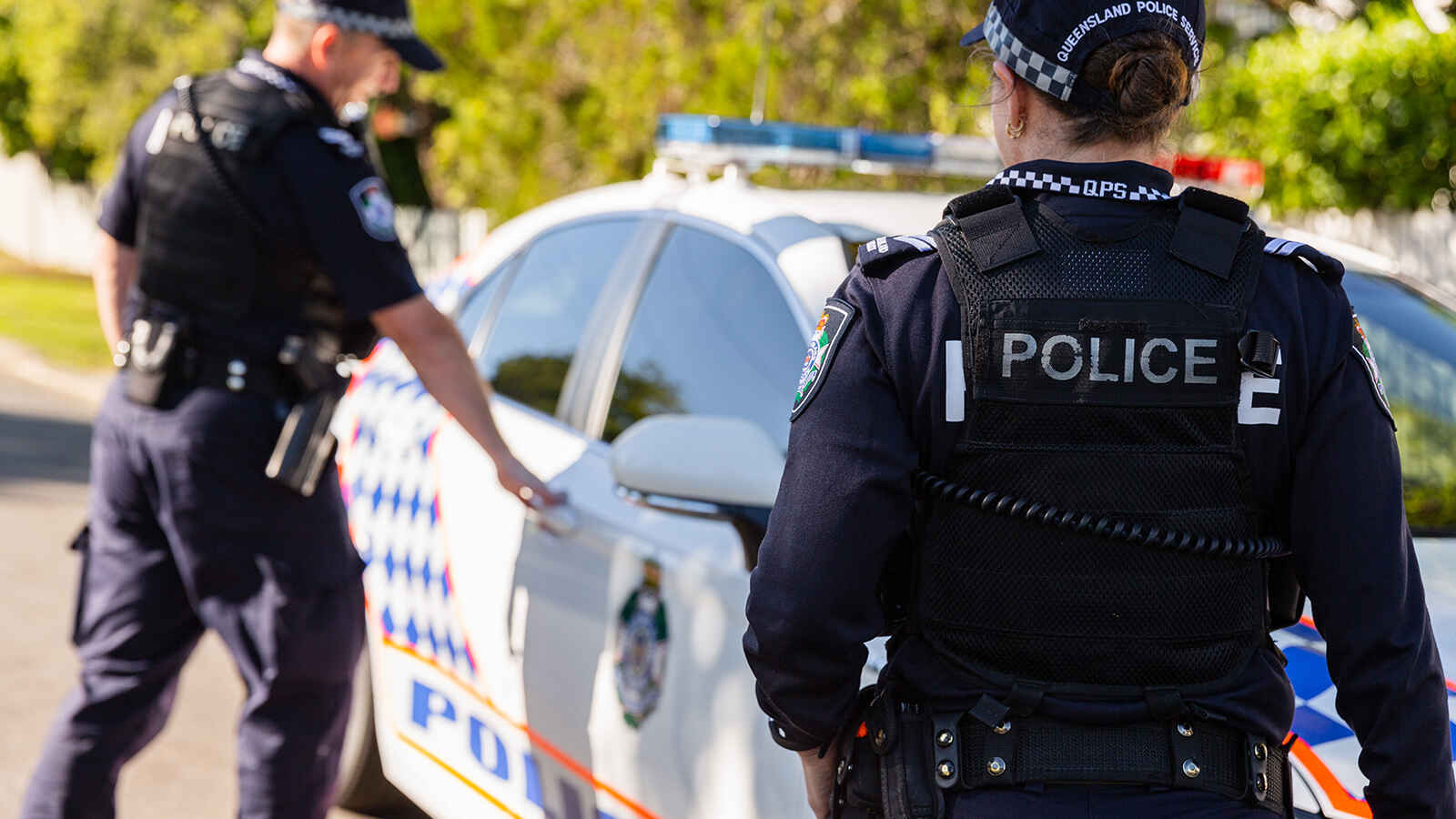
Can I change the court?
The court might agree to transfer the charge to another court in Queensland if you are pleading guilty and you have a connection to the new court. For example if you lived 3 hours away from the court it might be possible to transfer it to the court closer to where you live.
I live in another state what can I do about appearing in court?
In some circumstances the court might agree for you to not have to appear or to appear by phone in the court if you have engaged a lawyer to act for you. Please contact us for more information about this.
What do police have to prove?
As always, it is for the police to prove you committed the offence. It is generally quite easy to prove a charge of this kind. Police have very wide powers to test a driver or someone they suspect of driving with alcohol in their system. Most of the time a person charged with this offence will either be sitting in the driver’s seat of a car before they were tested, or had been driving a car before testing.
The testing for alcohol must occur withing 3 hours of the incident that bought the driver to the police attention.
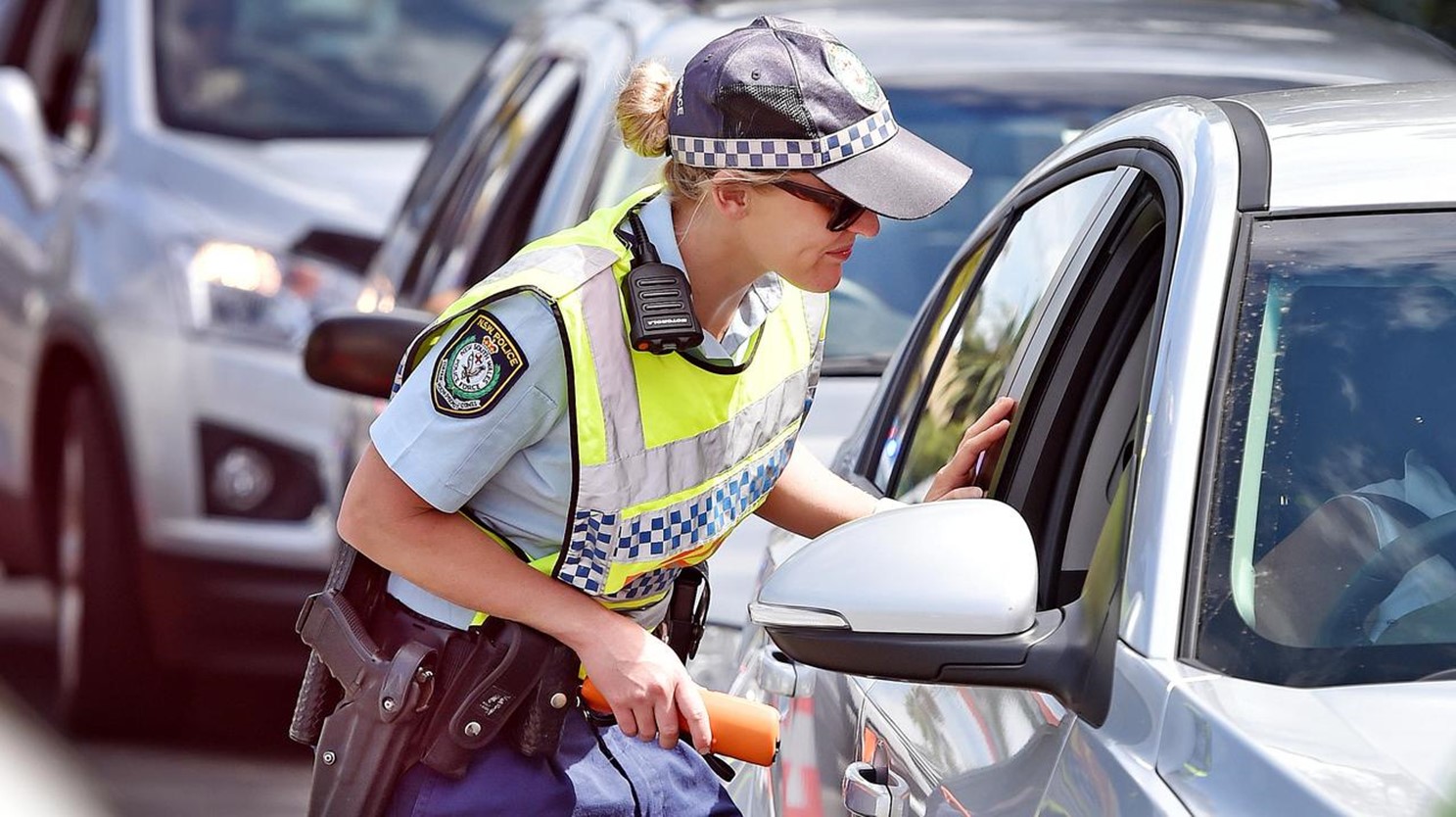
Can I beat a drink driving charge?
They are no “loopholes” for drink driving charges. The police must of course follow the rules and if they don’t it might open up the possibility of a defence but that is rare nowadays.
In general the following defences might exist if the circumstances match:
- Driver was not In charge of a vehicle
- Driver had not driven in the last 3 hours
- Driver consumed drinks after driving but before being arrested
- Driver had a medical condition that prevented giving sample of breath
- Police did not follow procedure
- Mistake
- An Extraordinary emergency occurred leading to the person driving
So can drink driving charges be dropped? Well it is rare. Generally we find the defence most likely to succeed is where the police have tested someone outside of the 3 hours after the person was last seen driving or the driving ended.
We have an article on defences to a drink driving charge that explains all possible defences.
Will I get a criminal record for drink driving?
Drink driving is considered to be a criminal offence not just a traffic offence but if a conviction is recorded that conviction is not recorded on the persons criminal history only their traffic record.
The courts are unlikely not to record a conviction on your traffic history unless specific evidence is placed before it that a traffic conviction will harm you in some way. It should be noted however that overseas travel may be more difficult or impossible if a conviction for a drink driving is recorded, especially to Islamic countries or the United States or Canada. In additional many jobs now require a person to provide a copy of their traffic history especially for those seeking a job in the transport industry.
We have a whole blog post on the recording of a conviction for a drink driving charge but in summary:
- Drink driving is a simple or summary offence which under Queensland law is a criminal offence so yes drink driving is a criminal offence in Queensland but not a crime (we know it gets confusing).
- While drink driving is a criminal offence the conviction, if recorded, would go on your traffic history but not on your criminal history. This means a person doing a criminal background or police check would not see the drink driving offence recorded however it would show on a person’s traffic history for 5 years.
- The court can still decide not to record a conviction in which case the drink driving charge will not appear on the persons traffic history.
Do I get to keep my physical licence?
No, you are required to surrender your licence to Queensland Transport by the day after the court disqualifies you or to the police prosecutor on the court date.
The surrender of your licence may in some circumstances deprive you of your main form of identification, you may therefore wish to attend Queensland Transport before the court and obtain a proof of age card to help with identification during your period of disqualification.
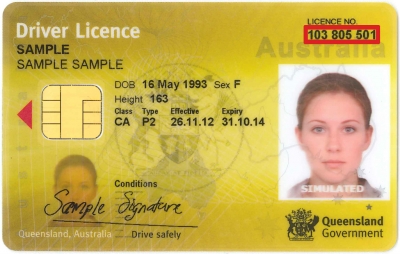
What will happen in court?
We have a great article on appearing as a drink driving lawyer in Brisbane that will give you more information on how a drink driving charge is dealt with in Brisbane.
In general terms, drink driving matters are dealt with “summarily”, which means that they are dealt with in a magistrates court. The different magistrate courts across Queensland deal with drink driving offences on their own or as part of a general, criminal law “call-over”. This depends on the size of the court. For example, Brisbane Magistrates Court has a dedicated courtroom that only deals with traffic matters. In Maroochydore the majority of drink driving charges are heard on a Monday, In Ipswich work licence application are heard on Tuesday, in smaller, regional courts (which usually only have 1 courtroom) like Pine Rivers, Noosa or Caboolture, you may find yourself in court with people charged with more serious criminal offences. Regardless, when you are charged, the police will give you a notice to appear in court or give you bail to appear in court on a specific date. The addresses of all Queensland Magistrates Courts can be found by clicking here.
In addition to the date, you will also be advised of what time you must be at court. Generally, you will be told to be at court at 8.30am or 9.00am (again, depending on the court). While you must be at court at this time, your matter will not be heard immediately. Instead, the court and the police prosecutor work together to decide the order in which matters will be heard that day. As a rule, anyone who has legal representation will be heard first, followed by everyone who is representing themselves.
At court for a drink driving charge
When you first get to court, your lawyer will speak to the police prosecutor. The police prosecutor will give your lawyer (we always obtain them before the court date so you can know exactly what the police are alleging occurred) a copy of the police’s court brief (in Queensland, this document is referred to as a “QP9”). The QP9 describes the drink driving charge for with which you have been charged, a brief outline of the facts that the police allege constitutes the offence, your criminal history (if any), your traffic history (if any), and a copy of the breath analysis certificate (which you should have received at the time you were charged). If you would like to know more about a QP9 and why it’s so important we have an article you can read.
If the QP9 is incorrect then negotiations would have to be had with the police prosecutor to amend the QP9, this is why we always get our clients QP9 before the court date so if changes need to be made they can be made before the court date as usually the police prosecutor will not amend the QP9 at court and therefore the charges would have to be adjourned to another date.
If you need to apply for a work licence, the court may adjourn your matter to a special day for hearing work licence applications (although not all courts do this). The work licence application and the drink driving charge must be heard at the same time. All of the affidavits and the application form must be filed and served before the date the court hears the work licence application.
If you require an adjournment, the court will give you a date to come back to court.
If you were charged with a low-range drink driving offence, your driver’s licence continues to be valid (unless it has been cancelled or suspended for other reasons) until the next court date and you can still drive. If you were charged with a mid-range or high-range drink driving offence, your driver’s licence remains suspended until the next court date and you must not drive during this time unless you apply for a section 79E temporary licence.
If you intend to plead guilty and already have legal representation and do not need to discuss your matter with the prosecutor, the court will finalise your matter on the first court date.
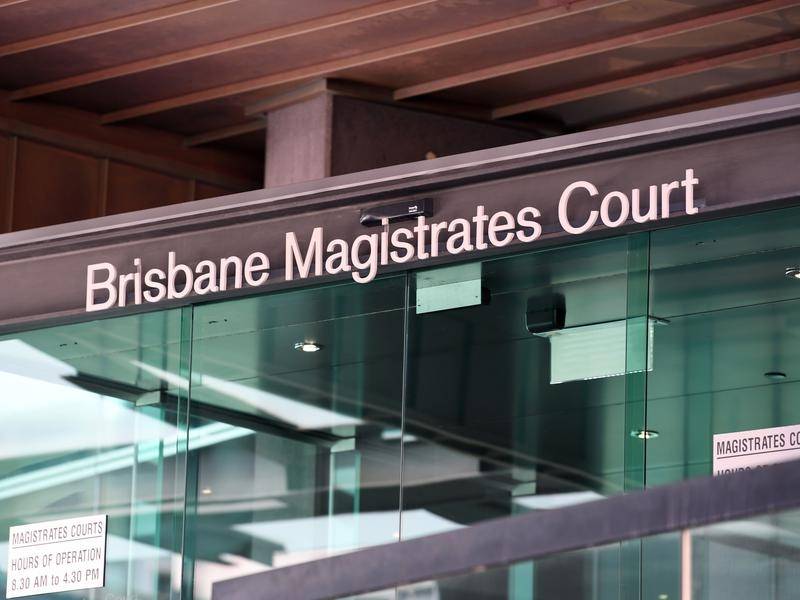
Pleading Guilty
If you plead guilty, the court will deal with your matter immediately. The magistrate will read the charge to you and ask you how you plead. The magistrate may also ask you if you are entering the plea of your own free will. The police prosecutor will then read the outline of facts and give the magistrate copies of the breath analysis certificate, your criminal history and traffic history. The police prosecutor may also offer an opinion as to what penalties should be imposed on you.
After the prosecutor has spoken, the magistrate will give you an opportunity to speak. Your lawyer (or you if you don’t have a lawyer) will then put explain what occurred, why it occurred, the positive things you have done since the offence, your general good character and the impact the penalty including the disqualification will have on you. This is done to support asking the magistrate to give you the minimum penalty that can be argued for on the strength of those facts and circumstances.
The court will also consider any other material you might have obtained that will help reduce the penalty such as character references or completing a driving course such at Queensland Traffic Offenders Program (“QTOP”). We are proud to be a sponsor of QTOP.
Once your Lawyer has spoken, the magistrate may seek further clarification of certain matter from the police, from your lawyer, or from both. The magistrate will then formally convict you, impose a penalty (which can cover the full range of penalties from fines, community service, probation, and up to imprisonment), and disqualify you from driving for a certain period of time. The licence disqualification takes effect immediately.
If you have applied for a work licence, the magistrate will indicate whether the application is granted. If it is granted the magistrate will state the conditions on which the licence is granted.
Once you are disqualified, you must immediately surrender your driver’s licence to the police prosecutor. It is an offence to be in possession of your licence after you have been disqualified from driving. Your lawyer will usually hand over your licence on your behalf. If you have been granted a work licence, you will not need to surrender your driver’s licence.
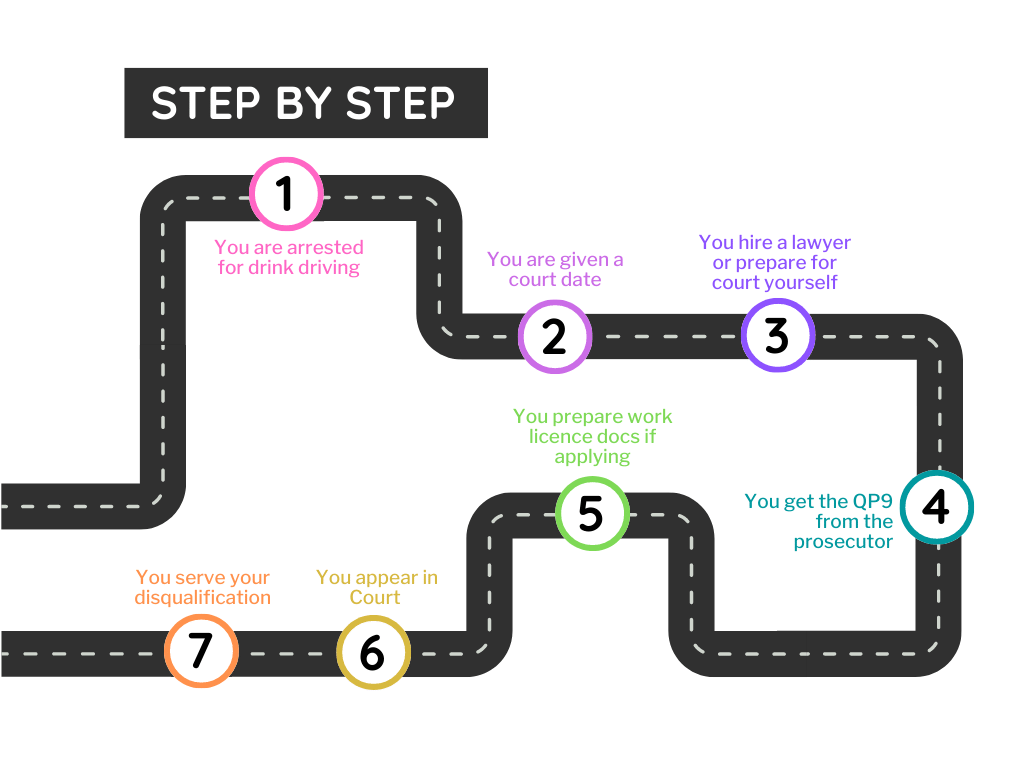
What factors will the court take into account?
As the peak traffic law experts in Queensland, we know exactly what the court wants to hear. The court will take into account, among other things, the following when setting the penalty:
- The level of your reading
- Whether you have prior drink driving offences
- The extent of your traffic and criminal history
- Your age
- Your current work arrangements
- Your family situation
- How the disqualification will affect your work and family commitments
- How early you pleaded guilty
- Your participation in any courses (such as the Queensland Traffic Offenders Program)
- How cooperative you were with police
- Your financial circumstances
- How the recording of a conviction might impact your future
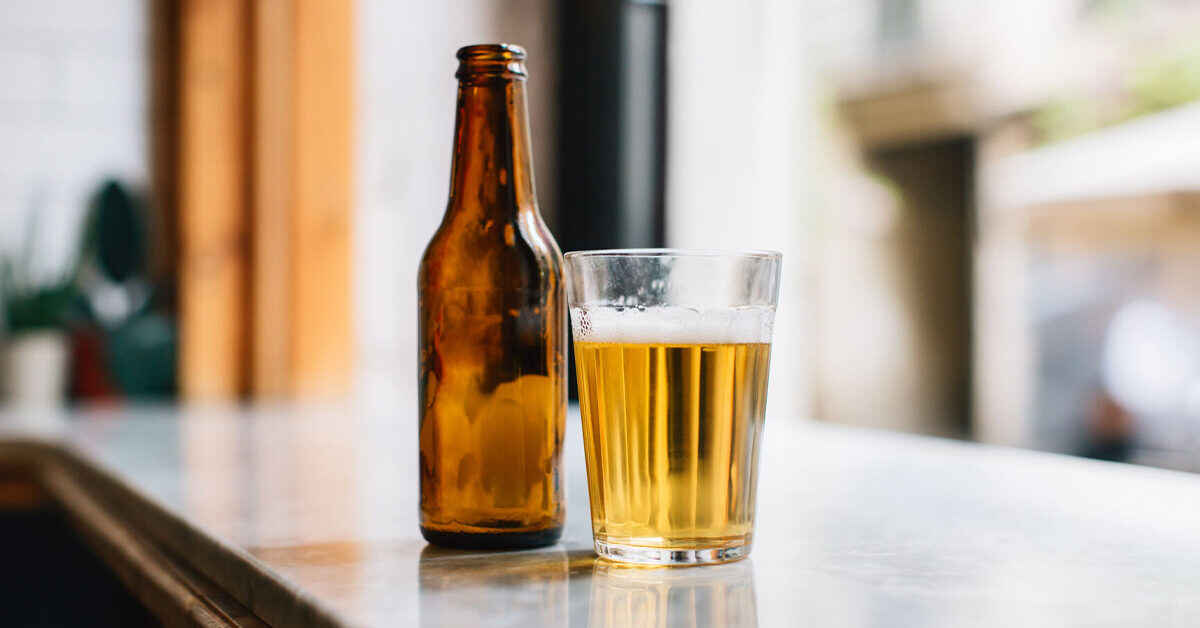
Will my matter be in the paper?
Possibly, the traffic court is an open to the general public, what this means is that any person is entitled to watch the court proceedings. This also means that a reporter is entitled to report on what occurred in the court. It is not possible to have the court ban the reporting.
When does the disqualification begin?
The disqualification starts immediately. You would not be able to drive once you leave the court. If your licence was immediately suspended because you were a mid or high range drink driver then the court will take into account the time you have been suspended but the disqualification period the court sets starts from the court date.
Will I need to fit an Interlock to my car?
You will be required to have an interlock device fitted to your vehicle for the period of one year once you are eligible to obtain your driver’s licence back if you are charged with high range or mid range drink driving (DUI or UIL) or this is your second drink driving charge within 5 years.
The court has no discretion to exempt you from an interlock if this applies to you as it is a Queensland Transport licencing requirement. This is an area that is subject to constant change, for more information visit their website.
Can you get an exemption from the interlock system? We have an article on all the exemptions to installing an interlock in Queensland but in general an exemption can only be applied for in the following situation;
- You live in a remote location.
- You live on an island.
- You have a medical condition that prevents you from providing a breath sample.
- Your family will experience severe hardship if you are not granted an exemption.
An interlock exemption cannot be granted if you are unable to install the interlock for employment, education or financial reasons.
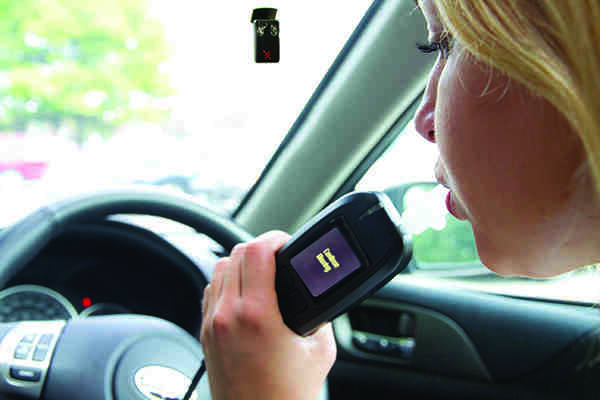
What happens after my disqualification period?
After the period of disqualification has ended you will need to attend Queensland Transport and reapply for your licence. You cannot simply start driving after your disqualification period has ended.
After you have been disqualified for a drink driving offence you will be on a probationary licence for one year, this means that;
- You have only 4 demerit points available
- You have a zero alcohol limit for 1 year
You do not have to re-sit any tests to get your licence back if you were licenced at the time of the offence. You will however need to complete a short course to get your licence back. For first time offenders this is done online. If you have 2 or more drink driving offences after 10 September 2021 then the course is longer and must be completed in person. Details can be found on the Transport Department Website
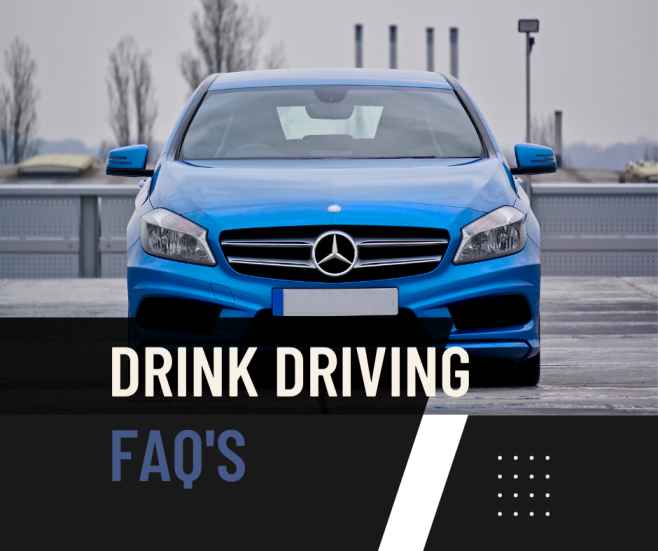
Drink Driving FAQ’s
What legislation control’s drink driving in Queensland?
The Transport Operations (Road Use Management) Act 1995
I have been charged with drink driving while supervising a learner driver
As a supervisor of a learner your BAC drops from .05 to the no alcohol limit so any alcohol in your system will see you charged with drink driving as you are effectively in control of the vehicle.
I have P plates can I get a work licence?
Unfortunately not, P Platers are on the no alcohol limit and anyone who is in the no alcohol limit cannot apply for a work licence. This includes truck drivers or taxi drivers.
I have a drink driving charge in Beenleigh court can you help me
Yes, we represent people charged with drink driving on the Gold Coast, Logan, Brisbane, Ipswich Caboolture, the Sunshine Coast, Gympie, Maryborough and Hervey Bay.
I pleaded guilty online now the Maroochydore Court has sent me a letter saying I must appear next week
You cannot plead guilty online to a drink driving charge. The Maroochydore court is wanting you to appear personally to deal with the drink driving charge.
I was caught drink driving Mackay but I live in Ipswich what can I do
In most cases we can transfer your drink driving charge to be heard in Ipswich without you having to first appear in Mackay court.
I got caught drink driving in Caboolture years ago but never went to court
Its likely the drink driving charge is still pending in Caboolture and an arrest warrant has been issued. We can arrange to go with you to court, get the warrant recalled and then deal with the drink driving charge before the Caboolture court.
My 17 year old son has been charged with drink driving
We often act for newly licenced drivers charged with drink driving. As the limit for a p plater is zero even a small amount of alcohol can show in a test and lead to a charge.
Any person under 18 is considered a child which means they will attend children’s court for the charge.
Recent case law provides a basis for us to ask the court not to disqualify their licence. This is because the children’s court has different rules than adult court. So if someone needs to drive for work or school the children’s court can decide not to disqualify the drivers licence.
I need the best drink driving lawyer
We have over 60 years combined experience with drink driving charges. Since 2010 we have helped people throughout the whole Southeast Queensland who are charged with drink driving. We have conducts over 1,500 drink driving pleas in that time.
I blew mid range and have a court date in Holland Park court in 4 weeks but the police told me I can’t drive until my court date but I need to keep driving or I will lose my job
In most cases the court is unlikely to agree to bring the court date forward as the police are given time to prepare for court. What you will need to do is urgently lodge an application for a section 79E temporary licence to keep driving and then if eligible apply for a full work licence on your court date.
Will I get any demerit points for a drink driving charge?
No, if your only offence is drink driving then you don’t get allocated any demerit points for drink driving.
I have court tomorrow can you help?
More than likely yes. We have 4 traffic lawyers covering all the courts in South East Queensland every day and we can take on work at very short notice.
What should my first step be after being arrested?
Get legal advice as quickly as possible. Things can be done before the court that will reduce the penalty or potentially allow you to apply for a work licence. Getting a lawyer on board quickly should be your first step.
Will someone be able to lookup and see that I got a drink driving charge?
It depends. The courts do not as a rule make drink driving convictions public. However the courts are open so the press can attend and report or other people can publish what occurred. If someone pleaded not guilty and took the matter to a trial the court might publish the trial result and their reasoning for that result online.
There is not central database the public can search to find out the outcome of any drink driving offence in Queensland.
Will I really lose my licence? can’t I get a section 10 bond?
Section 10 is under New South Wales law and does not apply in Queensland. If you plead guilty to drink driving you are going to lose your licence for some period of time, nothing can prevent that. It might be possible to get a work licence, if you are eligible, to allow you to drive for work purposes during that disqualification.
See our article on why section 10 does not apply in Queensland.

Top myths of drink driving
Myth #1 – You Cannot be Charged with Drink-Driving in Your Driveway
There are lots of reasons why this myth is wrong, most importantly, the legislation does not restrict where an alcohol offence can occur. In other words, you can commit these offences anywhere. You only need to be:
- Driving a motor vehicle;
- Attempting to put it in motion; or
- In charge of it.
and with prohibited amounts of alcohol in your system.
We have encountered cases where people have been charged with drink driving offences where their car was:
- Parked in a driveway;
- Parked in a garage with the door shut;
- Parked in a shopping centre or pub carpark;
- Parked on the side of the road; and
- Being driven on a dirt track on private property.
It is important to keep in mind that drink-driving laws in Australia are not uniform across the various States and territories so the laws in NSW will be different to the laws in Queensland.
Myth #2 – One Standard Drink per Hour will Keep You under 0.05 BAC
A long time ago, this myth was extensively advertised on television, on the radio, printed on posters, and printed on drinks coasters. Unfortunately, this advertising campaign was so successful that many, many people still think that this is a reliable rule of thumb to gauge whether it is safe to drive after drinking alcohol. Even more unfortunately, there are a number of mobile phone apps that you can download which record and count your drinks for you.
This myth is particularly seductive because it seems to have some basis in science. Blood-alcohol concentrations are the measure of the amount of alcohol that has been absorbed by your body, minus the alcohol that your body has metabolised, thus removing it from your system. The basis of this myth is that, if you keep the amount of alcohol you are putting in your system equal to (or less than) the amount of alcohol that your body processes, your blood-alcohol concentration should remain equal. While it is true that human bodies metabolise alcohol at a reasonably ascertainable rate, there are too many variables that are not taken into account by crude “drink counting” alone.
For example, the rate at which alcohol is absorbed into the bloodstream is affected by how much you have eaten prior to, and at the time of, drinking. It is also affected by the types of food you have eaten. Fatty foods, or carbohydrates will slow the rate of absorption compared to non-fatty foods. This is important because you merely delay when your blood-alcohol peaks. This is dangerous because your blood-alcohol could peak when you are driving; especially if you wait a considerable time after your last drink before driving.
Also, your metabolism is affected by many other variables, such as your age and your genetics. Smaller people are affected by alcohol more than their larger counterparts. Women process alcohol slower than men (for various, biological reasons). People with certain medical conditions (especially liver diseases) will metabolise alcohol slower than a healthy person. Lastly, experienced drinkers are less susceptible to the affects of alcohol than naïve drinkers, making them more at risk of judging themselves “safe” to drive.
Lastly, drinks are counted by reference to a “standard” drink. In Australia, a standard drink is one that contains 10 grams of alcohol. Many people try counting drinks where they are drinking at home, or at a friend’s home, where drinks are estimated, rather than measured. Also, heavy beers and premix spirits served in single-serve bottles or cans are almost always more than one standard drink.
None of these factors are accounted for by the drink-counting technique.
Myth #3 – You can “Sleep it Off” in Your Car
Drink driving offences are not limited to public roads. You can commit them anywhere. Furthermore you do not need to be driving a car to commit an alcohol related offence. You can also be charged with “attempting to put in motion” or “in charge” of a car while over the legal alcohol limit.
If the police find you sleeping in your car while over the legal alcohol limit, you will probably be charged with being “in charge” of the car while over the relevant limit. Being “in charge” of a motor vehicle has no precise definition in the legislation; however, there is case law which does provide some guidance.
In simple terms, being “in charge” has the underlying idea of being “responsible”. In Queensland, it seems that the courts consider someone must be responsible for cars parked on public roads. Therefore, you are in charge of your car until you give responsibility of your car to someone else. This notion is applied fairly broadly; for example, you can still be “in charge” of your car, even if it has been in an accident. Nevertheless, the legislation does provide for certain, very limited, circumstances where you will not be convicted of an offence even though you were found to be “in charge” of your car and were over the legal limit.
Myth #4 – You are Safe to Drive the Next Day
Speaking of driving the next morning, a common trap many of our clients fall into is driving the morning following a night of drinking, believing that they no longer have alcohol in their system. Regrettably, and depending on how much alcohol you drank the night before, this may not be the case.
As previously discussed, blood-alcohol concentration is the difference between the amount of alcohol you put in your system and how much alcohol your body processed out. If you drink alcohol at a faster rate than your body can process, your blood-alcohol will increase. Once you stop drinking, your blood-alcohol concentration will fall at a consistent rate. There is no other way to reduce your blood-alcohol concentration. Cold showers, drinking black coffee, drinking water, eating fatty foods, taking Berocca, sleeping, or throwing up, will not reduce your blood-alcohol concentration.
It follows then that, if you have a lot to drink, your body may not have processed all the alcohol out of your system by the time you wake up in the morning. What makes this particularly dangerous is that the effects of alcohol can be mistaken as a hangover.
It should be said that being mistaken about whether you are over the legal limit for driving is not a defence to a drink driving charge.
Should I get a drink driving lawyer to represent me?
Some people of course decide just to go to court and throw themselves on the mercy of the court and hope everything turns out fine.
The difficulty with this is the court can be harsh, the magistrate treats drink driving charges seriously. Unless you know what to say and what not to say to the magistrate then you won’t get the best outcome. Even a month or two extra disqualification is going to cost a lot in terms of lost work opportunities, extra transport costs and interference in your personal life.
Traffic Lawyers aren’t that expensive and you get to have an expert on your side taking care of everything at court and looking out for your rights and best interests.
If you want to engage us or just need further information or advice then you can either;
-
Use our contact form and we will contact you by email or phone at a time that suits you
-
Call us on 1300 952 255 seven days a week, 7am to 7pm
-
Click here to select a time for us to call you back
-
Email This email address is being protected from spambots. You need JavaScript enabled to view it.
-
Send us a message on Facebook Messenger
-
Click the help button to the right and leave us a message
Why should I choose you and not just represent myself?
We understand that many people do just represent themselves in court for a drink driving charge. Unfortunately some believe the duty lawyer will assist them which they will not for a drink driving charge unless you are facing a prison sentence.
We get calls all the time from people who have represented themselves in court and had a terrible outcome and are now desperate to try and do something to overturn the decision. Just some of the reasons to engage a drink driving lawyer includes;
- We have appeared in court thousands of times this means we know what the magistrates want to hear to minimise the disqualification period
- We can advise you if you qualify for a work licence
- We are there to look after your interests, neither the magistrate nor the police prosecutor is going to do that, you need someone on your side
- We can take you through the whole process so you are not worried what will occur in court as we would have explained everything to you and will be with you at court to assist you. This will dramatically reduce your stress levels
- We make sure everything is correct so there is not going to be a devastating outcome
- Engaging us shows the court you are taking your charges seriously, magistrates want people to be represented by lawyers
- You will be heard first meaning you could be finished within an hour rather than waiting all day in court to be heard
I will just use the duty lawyer at court, that’s free
Unless you are facing the prospect of prison then the duty lawyer cannot act for you at court. This means you will be facing the court and the prosecutor on your own.

A lawyer is not going to make any real difference
We have done 1000’s of drink driving charges. Having a lawyer always makes a difference. It doesn’t have to be us but always have a lawyer handle your matter in court. Even a month or two less disqualification is worth the price let alone the reduction in stress you will have with a lawyer by your side handling everything. Just the cost of ubers and taxis to get around for the few extra months that a lawyer can save makes it worth it, let alone the saving in stress and worry.
Remember in court only a lawyer is on your side, the magistrate and the police prosecutor are not.
I’m really embarrassed at what has occurred
That’s understandable most of our clients haven’t intentionally driven whilst over the limit. We have no judgement, good people make mistakes and we are here to try and get the best outcome for the client so they can go on with their lives. We built this firm on the basis we would offer understanding, compassion and real expertise in traffic law at a fair but not cheap price
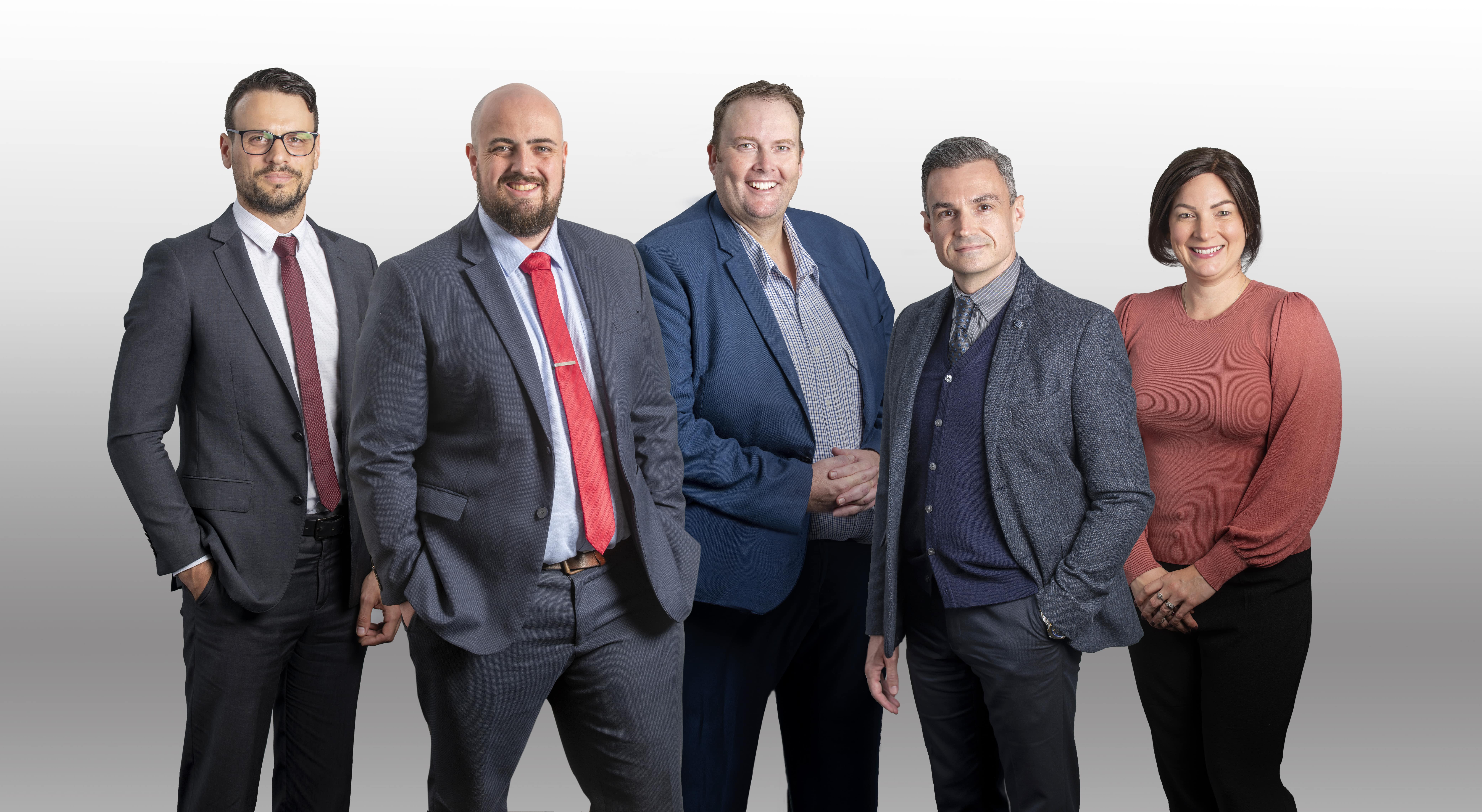
Our experience
Since 2010 we have been representing people throughout Southeast Queensland who have been charged with traffic offences such as drink driving and need a good drink driving lawyer to represent them. We aren’t a firm that does traffic law as just one area of law, we do traffic law exclusively. This means we have handled over 1,500 drink driving matters.
Our client’s often come to us nervous, worried and needing answers. This is not a time for uncertainty over your future nor the costs you will pay. The stress that a drink driving charge causes to people can be overwhelming, having an experienced drink driving law firm to help will give you a lot of relief.
We strive to give you immediate comprehensive advice and a fixed fee so you can be sure of your legal costs and whether you qualify for a work licence. While we will never be the cheapest we do offer the best value in our humble opinion.
Steven Brough our founder is one of the most experienced traffic lawyers in Queensland and makes sure the whole firm is professional, caring and effective in getting the best for our clients.
What courts do you appear in?
We appear in every court in Southeast Queensland from Southport to Hervey Bay. Just some of the courts we appear in are representing drink drivers include;
Brisbane
Holland Park Pine Rivers Richlands
Sunshine Coast
Gold Coast
Beaudesert Coolangatta Southport
Darling Downs
Fraser Coast
Maryborough Hervey Bay
Links that may be of assistance
List of Queensland Courts and their contact details
Daily list of Matters in Courts
List of Court Calendars for Queensland Courts
Where are your offices located?
We have 7 offices across Southeast Queensland. Please always ring first as your local office may be unattended if our staff are in court. We have spent years developing systems that mean in most cases you won’t even need to come in to see us to engage the best legal representation.
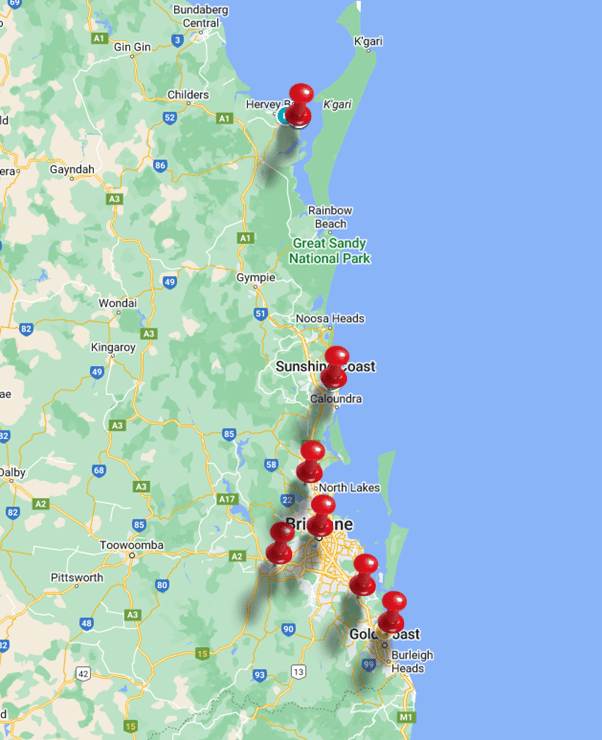
Is this all going to be a hassle to engage you?
No, we have offices in Brisbane and on the Gold Coast, Sunshine Coast, in Strathpine, Loganholme, Ipswich and Hervey Bay but in most cases we can handle everything by email and the phone without you ever having to come into our office. We are also open outside normal business hours for your convenience.
Most of the information we require you can complete with an online form from your phone or tablet.
You will also have the direct email address and mobile phone number of your lawyer so you can ask any question you may have. We believe in given client the very best experience possible and that starts with great communication and fast responses to your queries. Our client services manager Belinda is also just a phone call or email away to answer any questions you have.
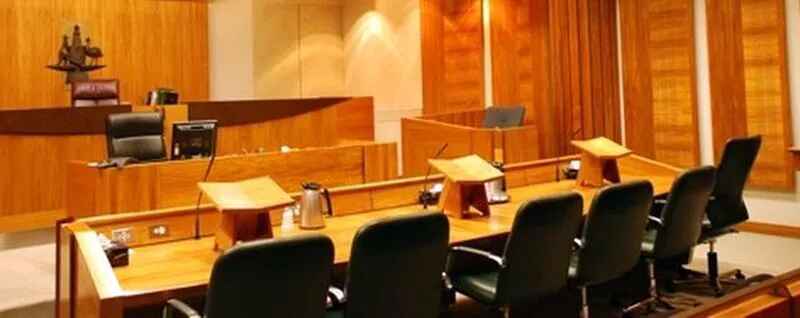
Our Team
Every one of our traffic lawyers is extremely experienced appearing in the courts every week representing people charged with drink driving.

Steven Brough – Founder and traffic lawyer (22+ years experience)

Russell Tannock – Traffic lawyer (8+ years experience)

Jack Marshall – Traffic lawyer (2+years experience)

Jacob Purden – Traffic lawyer (8+ years experience)

Belinda Smyth – Client Services Manager (21+ years experience)
Between our lawyers we have appeared in court thousands of times representing clients with driving charges throughout Southeast Queensland.
What do you charge?
We charge a flat upfront fee for our services, that means no hidden charges or unexpected bills. The money goes into a trust account and cannot be taken by us until the matter is completed.
We are also upfront with our fees, if you look at other law firms few, if any, clearly list how much they are going to charge you. Clarity Law on the other hand are happy to list our prices as we are sure that although we are not the cheapest our prices, given our experience, is very competitive
Click here to see what we charge or see below for our current prices for a first time drink driving offence.
Work Licence (includes price of guilty plea) $2,200
Drink Driving - Low range $1,499
Drink Driving - Mid range $1,599
Drink Driving - High range $1,699
If this is not your first drink driving charge, you have other charges or an extensive history we will provide you with a fixed price quote.

If I contacted you what would occur?
If you contact us, then Steven Brough the firm’s founder or our office manager Belinda Smyth will take the call or receive the email or contact form. They have over 45 years legal experience between them, we can provide immediate legal assistance and answer any questions you have. We will discuss your case, provide guidance and send a quote by email with additional relevant information about your charge, all at no cost.
If you want to engage us then it’s easy, there is a form you can complete online in less than 15 minutes. If you don’t want to engage us or want to engage another firm that’s fine, you won’t be hassled and at worst you will just have more information about your charge. Once engaged one of our lawyers will go through your matter and contact you to discuss what the best way forward is to achieve the best results. Every one of our lawyers are very experienced with many hundreds of courts appearances for drink driving charges each.
Remember its critical you get advice before going to court, a drink driving charge no matter the reading will have an impact on you, your family and your employment or business.
How do I get more information or engage you to act for me?
If you want to engage us or just need further information or advice then you can either;
-
Use our contact form and we will contact you by email or phone at a time that suits you
-
Call us on 1300 952 255 seven days a week, 7am to 7pm
-
Click here to select a time for us to have a free 15 minute telephone conference with you
-
Email This email address is being protected from spambots. You need JavaScript enabled to view it.
-
Send us a message on Facebook Messenger
-
Click the help button to the right and leave us a message
We are a no pressure law firm, we are happy to provide information to assist you, if you want to engage us then great, if not then you at least have more information about drink driving.
You won’t be chased or hounded to engage us. Remember its critical you get advice before going to court, a drink driving charge no matter the reading will have an impact on you, your family and your employment or business.
Need more information?
We have a range of articles on drink driving on our traffic law blog. Some of the most recent have included:
- Queensland Drink Driving (2024)
-
Case Study - High Range Drink Driving and Disqualified Driving
-
Going through a drink driving charge in Brisbane Magistrate Court
-
Navigating Drink Driving Charges in Queensland: Top 5 Do's and Don'ts
-
Disqualification vs Suspension, what is the difference in Queensland?
-
How does a traffic matter proceed in the Southport Magistrates Court?
-
Will I get a criminal conviction for a drink driving charge?
What our clients say about us
This article general information only and not legal advice and is written subject to our disclaimer that can be read by clicking here
Liability limited by a scheme approved under professional standards legislation




